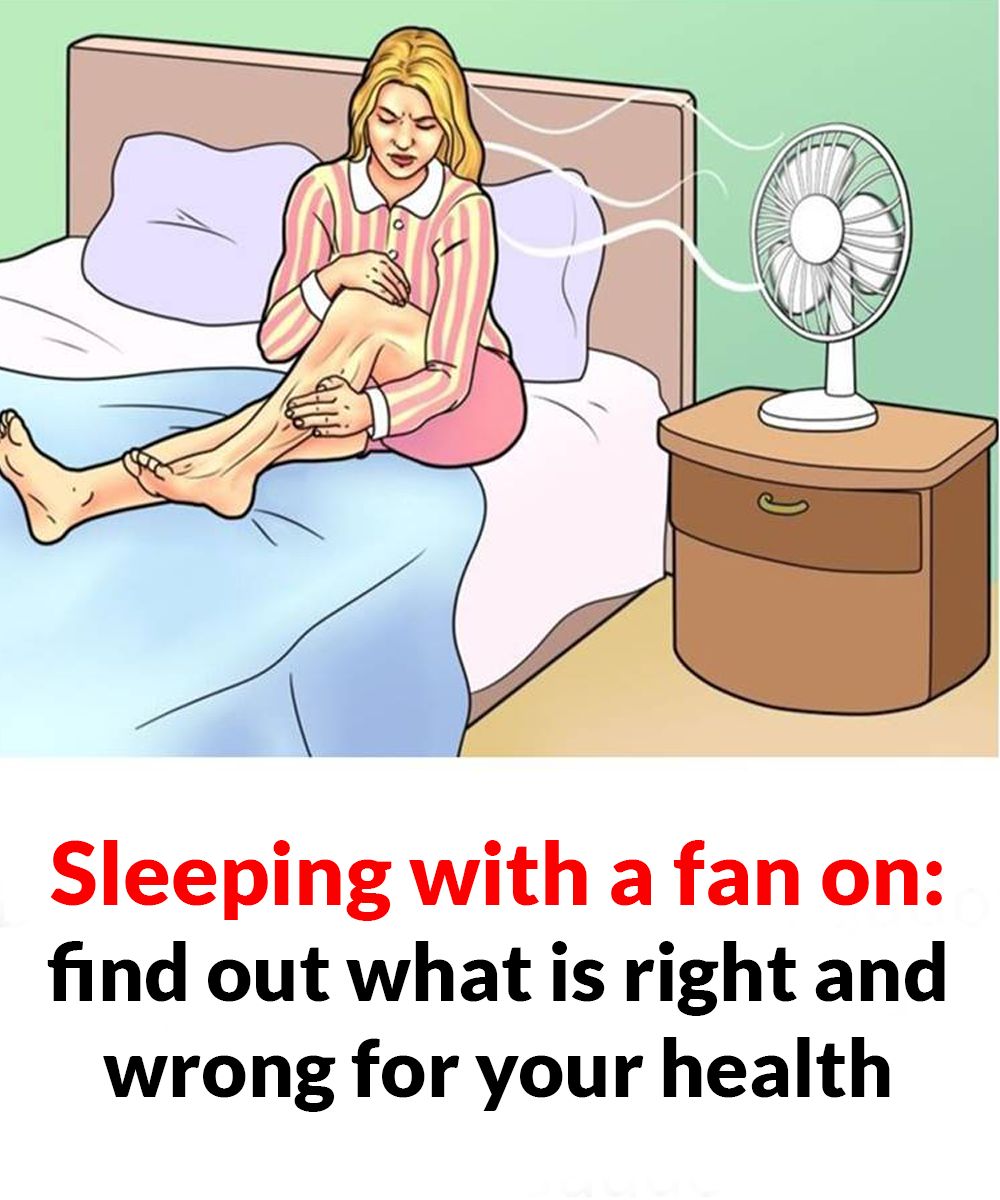Do you find yourself turning on a fan every night before going to sleep? You’re far from alone. Millions of people can’t drift off without that soft hum in the background or the gentle breeze brushing against their skin. It’s a familiar comfort — one that brings a sense of calm after a long day. The whirring sound of a fan has almost become part of the bedtime ritual for countless households, especially during hot summer nights when air feels heavy and still. But while fans can make sleeping more comfortable, they’re not without their drawbacks. There are some subtle effects — both positive and negative — that you might not even realize are happening. Understanding them can help you decide whether your nightly fan routine is truly benefiting your health and sleep.

Let’s begin with the positives, because they’re pretty significant. One of the biggest reasons people love sleeping with a fan is the soothing white noise it creates. That steady hum acts like an audio blanket, covering up disruptive sounds like distant traffic, barking dogs, or your neighbor’s late-night TV. The fan’s hum creates a consistent background sound that helps your brain tune out random noises, allowing you to fall asleep faster and stay asleep longer. For those who live in busy cities or who are naturally light sleepers, this can be a real game-changer. Studies have shown that people who sleep with consistent white noise tend to have fewer awakenings during the night, leading to deeper, more restorative rest.
Another major advantage is temperature control. Fans keep air circulating, helping your body maintain a more comfortable temperature. When your bedroom gets too warm, you might find yourself tossing, turning, and waking up drenched in sweat. A fan helps prevent that by moving air across your skin and aiding in the body’s natural cooling process. Even a small drop in temperature can make a huge difference in sleep quality. People often underestimate how much temperature affects rest — our bodies sleep best in cooler conditions, typically around 65°F (18°C). That’s why fans are especially popular during summer months or in regions where the nights stay warm and humid.
Beyond comfort, improved airflow can also mean better air quality. A fan helps move stagnant air and can prevent the buildup of allergens such as dust, pollen, or pet dander. This can be particularly helpful for people with mild allergies or asthma, as cleaner, fresher air can make breathing easier at night. Some even find that a fan helps reduce feelings of stuffiness and keeps the air from feeling “stale,” especially in smaller bedrooms or spaces without great ventilation.
Interestingly, some studies have suggested that fans might even help babies sleep more safely. A few pieces of research have shown that having a fan running in an infant’s room might reduce the risk of sudden infant death syndrome (SIDS). Scientists believe this may be due to better air circulation, which helps prevent the buildup of carbon dioxide around a sleeping baby’s face. While more research is needed to confirm these findings, it’s still a fascinating and hopeful discovery for new parents seeking to create a safer sleep environment for their little ones.
But of course, nothing is perfect — and fans are no exception. Alongside their many benefits, there are also a few potential downsides that are worth paying attention to. One of the most common complaints is dryness. Fans tend to reduce humidity in the air, which can lead to dry skin, chapped lips, or irritated eyes. You might also wake up with a scratchy throat or congested nose if the air in your room becomes too dry overnight. This problem becomes even more noticeable during winter months when indoor heating is already pulling moisture out of the air. A simple solution is to pair your fan with a humidifier to restore balance. This combination allows you to enjoy the cooling effect without sacrificing comfort or skin health.
Another common issue is muscle stiffness or soreness, particularly in the neck or shoulders. If your fan is blowing directly at you for hours, that continuous stream of cool air can cause muscles to tense up while you sleep. The next morning, you might wake up with a stiff neck or dull ache that feels suspiciously like you slept in a bad position. The fix is simple — just reposition your fan so it circulates air around the room instead of directly at your body. Oscillating fans work great for this because they move air evenly throughout the space.
Cleanliness is another factor that often gets overlooked. While a fan helps circulate air, it can also stir up dust and spread allergens if it hasn’t been cleaned regularly. Over time, dust can build up on the blades and housing, and every time you turn the fan on, it sends those particles right back into the air you breathe. That’s why cleaning your fan every couple of weeks is crucial — not just for hygiene, but also for maintaining good air quality.
Some people also discover that they become too dependent on the noise. While white noise helps most people relax, a few may find that they can’t fall asleep without it, making it difficult to rest in quieter environments like hotels or while traveling. Additionally, if your fan is too loud or starts making uneven noises, it could end up doing the opposite of what it’s meant to — keeping you awake. In those cases, switching to a quieter, high-quality fan or using a white noise app might help.
Lastly, there’s the matter of energy use. Keeping a fan running all night does consume electricity, which can slightly increase your utility bill over time. Although fans are far more energy-efficient than air conditioners, every bit adds up — especially if you have multiple fans running throughout your home. For a greener solution, you can try using an energy-saving model or setting a timer so the fan automatically turns off after you fall asleep. Some modern fans even come with built-in eco modes designed specifically for nighttime use.
So, what’s the final verdict? Sleeping with a fan on isn’t inherently good or bad — it depends on your personal needs and environment. If you live somewhere hot, humid, or noisy, a fan can be a sleep saver, offering both comfort and calm. But if you struggle with dryness, allergies, or muscle tension, you may want to make a few small adjustments to minimize the downsides.
In the end, the key is balance. Keep your fan clean, maintain proper humidity, and avoid pointing the airflow directly at your body. That way, you can still enjoy the cool, steady hum that lulls you into deep sleep — without waking up with dry eyes or a sore neck. Like many things in life, the benefits depend on how you use it. When used mindfully, a fan can transform your bedroom into the peaceful retreat you need for a truly restful night.





